Implementing an Offsite Corporate Power Purchase Agreement (PPA) between JERA and East Japan Railway Company to Supply Solar Power to Atre and Lumine2025/01/15
○ JERA Co., Ltd. (“JERA”) and East Japan Railway Company (“JR East”) concluded a basic agreement on 14 January 2024 aimed at implementing an offsite corporate power purchasing agreement (a mechanism for supplying environmental value*1 from an offsite power generation facility to an electricity consumer).
○ As a specific initiative, JERA as solar power producer, JERA Cross Inc. (“JERA Cross”) as aggregator*2, and East Japan Railway Trading Co., Ltd. (“East Japan Railway Trading”) as electricity retailer will supply renewable energy to Atre Oimachi and Lumine Yokohama beginning 1 February 2025.
○ In addition, East Japan Railway Trading will also supply electricity derived from food waste. This initiative to supply station buildings with a combination of multiple renewable energy sources is a first for the JR East Group.
○ Both the JERA Group and the JR East Group are committed to contributing to achieving a decarbonized society through the effective use of renewable energy.
1. Project Summary
JERA Cross will bundle electricity generated at JERA solar power plants together with its environmental value and supply it, through East Japan Railway Trading, to JR East Group station buildings.
In addition, East Japan Railway Trading will also supply electricity generated using food waste from JR East Group's Atre and Lumine station buildings and other facilities (with J Bio Food Recycle Corporation*3 as power producer).
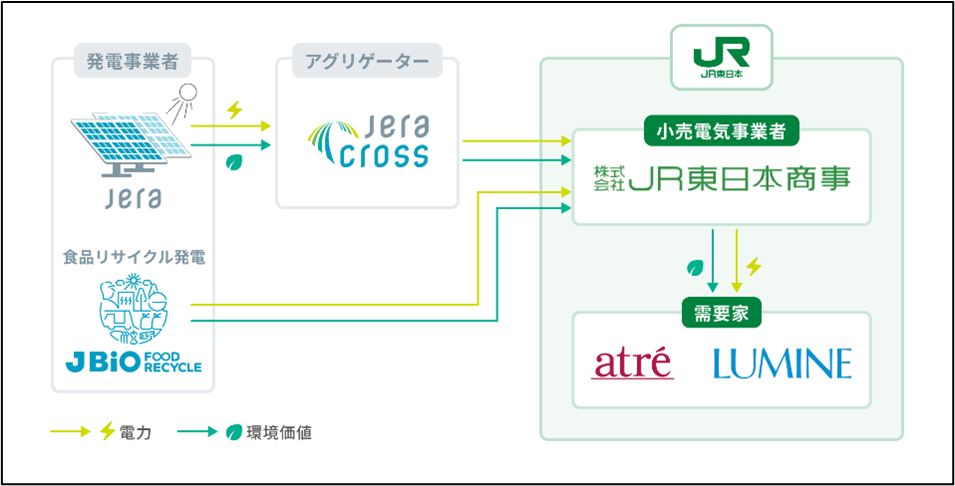
・Start of Supply:1 Feb. 2025 (Planned)
・Supply Destinations:Atre Oimachi, Lumine Yokohama
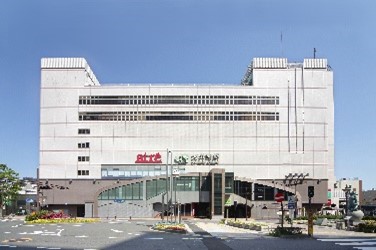
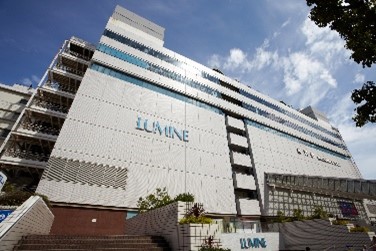
•Source JERA Solar Plants: Locations 42 in the Kanto region
Generation capacity Approx 2,000 kW
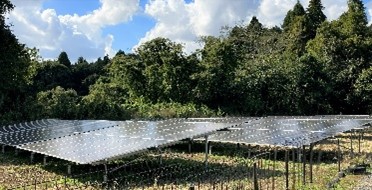
•Impact of Implementation: Annual reduction in CO2 emissions of approx. 1,543 t-CO2 (equivalent to about 1,000 households)
2. Initiatives by Each Group
(1) JERA Group
The JERA Group, under its JERA Zero CO2 Emissions 2050 commitment to aim for net-zero CO2 emissions from its domestic and international operations by 2050, is expanding its use of renewable energy and working to develop zero-emissions thermal power that emits no CO2 during power generation.
(2) JR East Group
The JR East Group, under the “Practicing ESG Management” section of its Group Management Vision “Move Up 2027,” aims to contribute to the sustainable development of regional society and to the realization of sustainable development goals (SDGs) by solving social issues through its businesses. In addition, in 2020 the Group formulated its Zero Carbon Challenge 2050 long-term environmental goal and is taking on the challenge of achieving net-zero CO2 emissions across the entire JR East Group by FY 2050.
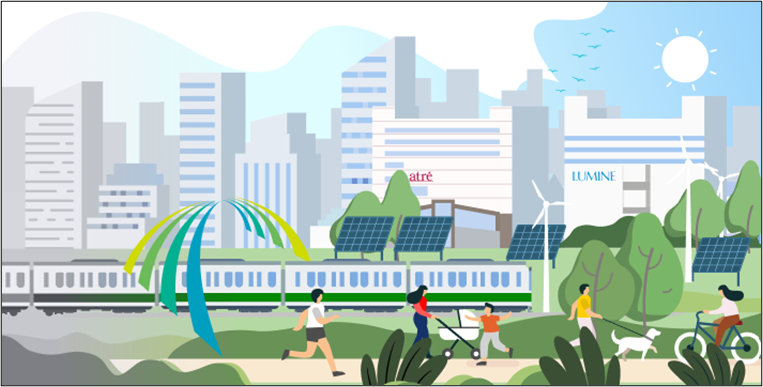
*1 Environmental Value:
*2 Aggregator:
A business that bundles together and centrally manages multiple energy resources such as power generation or energy storage facilities.
*3 J Bio Food Recycle Corporation:
Established in 2016 with investments from JFE Engineering Corporation, J&T Recycling Corporation, East Japan Railway Company, and JR East Environment Access Co., Ltd., this company converts food waste from JR East Group station buildings and station shopping areas into biogas for power generation.
Reference: 27 March 2024 press release “JR East Group Promotes Power Recycling Loop for Food Waste” (Japanese language only)

